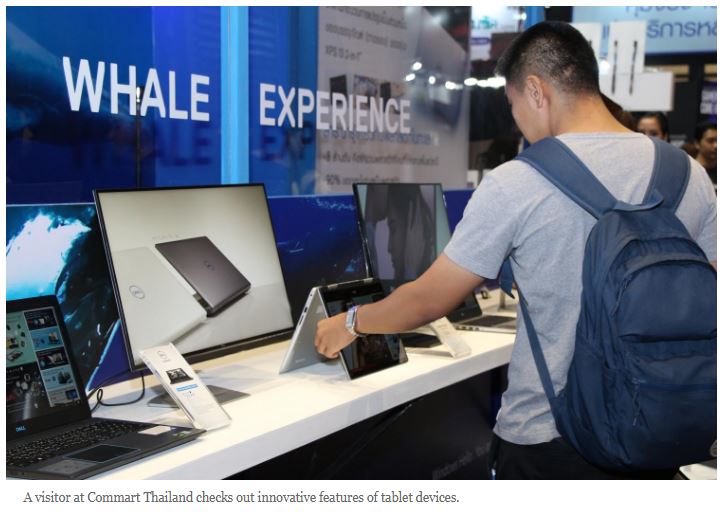Thailand: Tax perk aims to help SMEs join digital wave
The Digital Economy Promotion Agency (Depa) plans to offer a 200% tax deduction for the purchase of smart devices, digital services, robotics and Internet of Things (IoT) devices by small and medium-sized enterprises (SMEs), in addition to software, starting next year.
From 2017 to this year, SMEs have been entitled to tax deductions of up to 200% of the value of computer programs they buy, but the incentive places a ceiling of 100,000 baht in product value. These software providers must be registered with Depa.
The cabinet will be asked to approve the extension of the tax deduction, which is expected to run from Jan 1, 2020 to Dec 31, 2022, said Chatchai Khunpitiluck, vice-president of Depa. The ceiling will be pushed up from 100,000 baht to 200,000 baht.
From next year, the incentive will be widened to cover hardware and smart devices, 3D printers, IoT devices, robotics, drones and wearable devices, as well as digital services, which include cloud-based services, digital architect design services, consultations, fintech, agriculture tech and medical tech.
Qualified digital services must be run by Thai operators and certified with ISO/IEC 20000.
SMEs eligible for the scheme must have fixed assets worth less than 200 million baht, excluding land, and fewer than 200 employees.
Citing a study titled “Investment Stimulation Measures in Industry and Digital Innovation” by the Fiscal Policy Research Institute Foundation, Mr Chatchai said the tax incentive could encourage SMEs to embrace digital technology, which could help raise 770 million baht in revenue and 280 million baht in employee salaries per year.
The tax incentive could generate 420 million baht from consumption and 620 million baht from investment, though the government could lose 180 million baht in tax revenue.
Mr Chatchai said that under the existing tax incentive, 140 software firms registered with Depa from January 2017 to April 30, 2019. The scheme is expected to boost the 1.3-billion-baht investment in software business and inject 3.15 billion baht into the economy.
The study found that Thailand has better tax privileges than other countries in terms of periods of tax exemption and deductions, which should help draw investors.
Mr Chatchai said the tax incentive would help create substantial demand for software, hardware and digital services.
“If we can increase investment by 1% in digital technology in the private and public sectors, GDP would rise by 0.0253%,” he said.
The study recommended policy- makers set up a “digital one-stop service” to facilitate paperless operations between private and state sectors, which should help save costs and hasten the process.
In 2019, Thailand ranked 27th out of 190 countries in global ease of doing business as reported by the World Bank.
The study also suggested the launch of a digital venture capital fund for SMEs that want to invest in the Digital Park in the Eastern Economic Corridor area.
“The tax incentive scheme is only one measure, but ease of doing business and a clear roadmap for new types of service licences from regulators is important to stimulate the overall digital industry,” Mr Chatchai said.
Source: https://www.bangkokpost.com/business/1729303/tax-perk-aims-to-help-smes-join-digital-wave


 Thailand
Thailand




